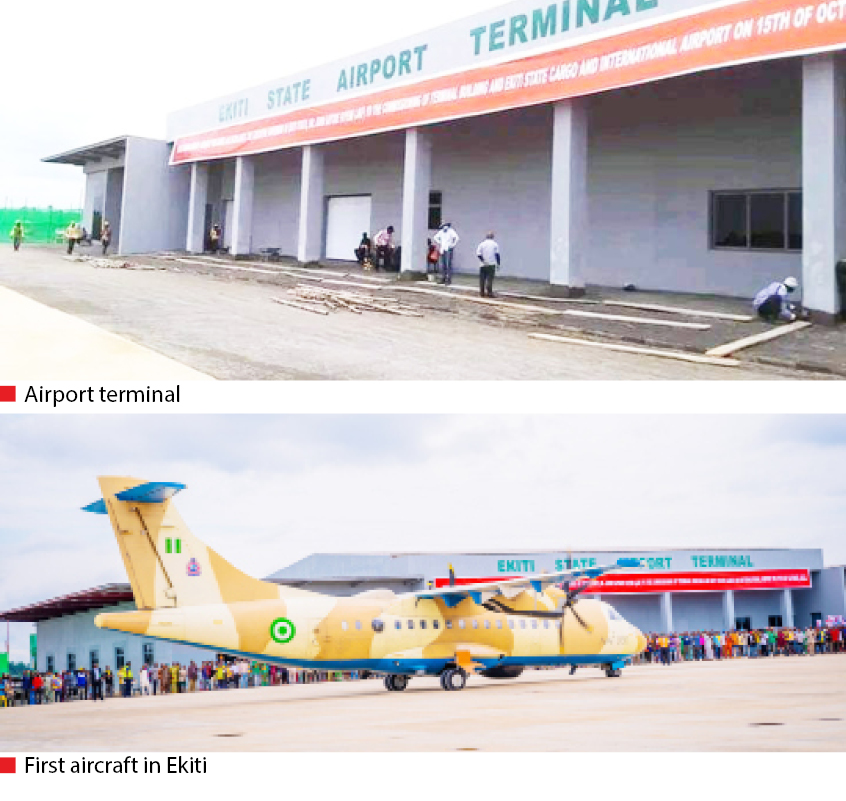Why Ekiti airport remains dormant one year after ‘commissioning’
It has been over a year since the Ekiti Cargo International Airport was commissioned amidst fanfare and excitement but not a single commercial aircraft has landed at the airport since its commissioning, Daily Trust Saturday can report. In October last year, the outgoing governor Kayode Fayemi inaugurated the airport to the excitement of the people […]

Former Gov Kayode Fayemi, former Minister of Aviation, Hadi Sirika and others at the ‘commissioning’ of the Ekiti Airport in 2022
It has been over a year since the Ekiti Cargo International Airport was commissioned amidst fanfare and excitement but not a single commercial aircraft has landed at the airport since its commissioning, Daily Trust Saturday can report.
In October last year, the outgoing governor Kayode Fayemi inaugurated the airport to the excitement of the people of the state.
A military aircraft, ATR-42, belonging to the Nigerian Air Force, touched down at the airport. It was a historic moment which the people of Ekiti cherished.
The elated Governor Fayemi said the commissioning of the airport project which started in 2019 was his parting gift for the people of Ekiti State. “My job is done, Ekiti Kete”, he had declared boisterously 24 hours to his exit from office.
FG to investigate 5 years licence extension for DisCos
Supplementary budget not insensitive, FG replies Obi
After the symbolic commissioning, many people had thought that commercial flights would start taking off and landing at the airport even though it was obvious from the beginning that the airport was not ready at the time of commissioning. This further explains why a military plane, an ATR 42, was deployed to bypass the stringent requirements for an airport to be certified for commercial operations.
The airport was commissioned in October last year and for over a year now, the multibillion-naira project has remained dormant.
Over the years, state governments have made it a pastime to embark on airport projects without considering its viability and the economic burden it adds to the regulatory activities of the regulator.
No fewer than six states are currently embarking on airport projects. From Ekiti, to Osun, Ogun, Nasarawa, among others, the craze to build airports has largely been driven by prestige according to stakeholders and not the economic importance.
Some stakeholders commend the immediate past administration in Ekiti for the cargo airport, considering the huge volume of cargos across the country but the dormancy of the airport has been a cause for concern.

Our correspondent learnt that the airport is yet to meet the requirements for certification for commercial flights as stipulated by the Nigerian Civil Aviation Regulations (NigCARS) 2023 in Part 12 which deals with Aerodrome Certification.
Part 12.1.1.5 of the regulations says, “No person or corporate entity shall commence construction or reconstruction of an aerodrome without approval of the Authority (b) Pursuant to 12.1.1.5(a) above, an applicant for the establishment of an aerodrome shall in accordance with the requirements and procedures prescribed in subpart 4, process and obtain the Authority’s acceptance of the aerodrome layout plans.
(c) An aircraft shall not take off or land at a place in Nigeria other than — (1) an aerodrome certified or for which a permit has been issued under this Part, pursuant to the requirements of section 12.1.2 and 12.1.5 for the take-off and landing of such aircraft; (2) a State aerodrome, notified as available for the take-off and landing of such aircraft, in respect of which authorization has been granted by the Authority (3) any other aerodrome, other than an aerodrome referred to in paragraph 12.1.1.5(c)(1) and (2) in respect of which the Authority is of the opinion that meeting the requirements necessary for the issuance of an aerodrome certificate or permit would be in the public interest and would further the safe operation of the aerodrome.”
At the moment, the airport, though inspected by the NCAA, is yet to be certified fit for commercial operations. Sources said the NCAA had already given a manual to the authority of the airport on what to do to get the airport certified.
“I am aware the state has applied to the authority for the certification of the airport and we are working on it,” said a source who spoke with our correspondent.
State airports: A burden?
Though the airport is undergoing the certification process, it was not clear yet if it would be handed over to the Federal Airports Authority of Nigeria (FAAN) as is the practice, thereby adding to the burden of FAAN.
Already, the NCAA said it is overburdened with having to regulate some of the airports which are not viable. There are some airports in Nigeria at the moment which don’t operate more than one or two flights in a week and as the regulatory authority, NCAA inspectors must be on ground.
Recently, the Director-General of Civil Aviation (DGCA), Capt. Musa Nuhu, said unviable airports have become a huge drain on the resources of the NCAA and if he had his way, most of those airports would have been shut down.
He said, “There are two processes of building airports; first is the policy side, which the ministry gives. So, if you want to build an airport, you will write to the Minister of Aviation and Aerospace Development. The ministry will form a committee, comprising the Aerodrome department of the ministry, NCAA will be part of it, the Federal Airports Authority of Nigeria (FAAN) and Nigerian Airspace Management Agency (NAMA) will go through the feasibility study of the airport. They go visit the site, and initially these things are perfect.
“They have a good business case, everything is okay. The committee comes back, and the minister will recommend, and give approval. It comes to NCAA, we start building the airport, it gets to 70 per cent and then everything fritters. There are quite a few airports like I told you that are built and they have not even met the requirements, so much money has been spent, but they have not reached the minimum requirement.
“And the unfortunate part which people don’t see is that many atimes, these state governments hand over the airports to FAAN, which means NCAA has to have more aerodrome inspectors. It is a burden on me. So, we must inspect it and make sure it is okay. NAMA has to employ and train more air traffic controllers. These are things people don’t see; it is a burden on us.
“And these airports do not even generate money; there are airports that have one or two flights a week. Some are even executive flights. Honestly, we must collectively find a way to deal with that because for me, even as a CAA, it is putting a lot of unnecessary pressure on us.”
On when the Ekiti State Airport would commence operation, the state government recently said that some major facilities needed are yet to be completed after over one year of inauguration by the former governor.
In a recent chat, Governor of Ekiti State, Mr Biodun Oyebanji, said the airport is going on well but air travel is not like land travel.
“After the commissioning, we brought the NCAA to come and look at the airport to do certain things for the travellers and we have almost concluded that. The airport will be fully operational by the special grace of God in 2024.
“We just want to ensure that everything is done the way the regulatory body has asked us to do it. I thank God that we have brought them to tell us and they told us to do some certain things.
“That brought about additional work and additional cost and these things don’t come cheap. The airport is almost completed.”
Comrade Olayinka Abioye, an aviation stakeholder, said many states are embarking on airports without considering their viability.
“So, I see the establishment of airports by state governors as a fraudulent action, a way for them to cover their tracks. They will tell people that they have spent so much trillions or billions in this airport,” he said in a chat with our correspondent.
Chairman of the FAAN’s Aviacargo Committee, Mr Ikechi Uko, said Ekiti Airport can be kept busy with the facilities within the zone it was sited. He gave the example of the Industrial Park and ABUAD Farm belonging to Afe Babalola, saying the farm can take advantage of the airport when operational to export its produce.
